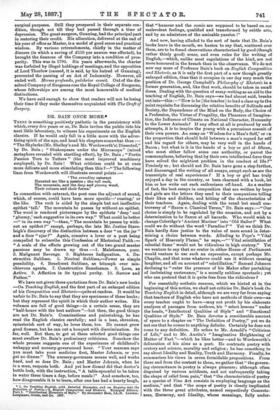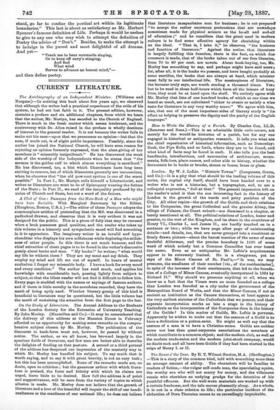DR. BAIN ONCE MORE.*
THERE is something positively pathetic in the persistency with which, every five years or so, Dr. Bain invites the public into his neat little laboratory, to witness his experiments on the English classics. If he would only fall in a little more with the adver- tising spirit of the age, and head his chapters somewhat thus :- "The Skylarks (Mr. Shelley's and Mr. Wordsworth's) Dissected," by Dr. Bain ; " Shakespeare under the Microscope" (mixed metaphors revealed with startling effect), by Dr. Bain ; " Poetic Passion Torn to Tatters " (the most improved machinery employed), by Dr. Bain ! What criticism could be at once more delicate and more stimulating than this ?—" The following lines from Wordsworth will illustrate several points The sounding cataract Haunted me like a passion ; the tall rook, The mountain, and the deep and gloomy wood, Their colours and their forms.'
In connection with cataract, the poet uses the adjunct of sound, which, of course, could have been more specific= roaring,' or the like. The rock is aided by the simple but not ineffective epithet 'tall' The mountain he passes by without an epithet. The wood is rendered picturesque by the epithets deep ' and gloomy,' each suggestive in its own way." What could be better —" in its own way "—than, " The mountain he passes by with- out an epithet ?" except, perhaps, the late Mr. Justice Stare- leigh's discovery of the distinction between a door "on the jar" and a door " ajar P" Again, conceive a lover or a poet being compelled to subscribe this Confession of Rhetorical Faith
A scale of the effects growing out of the two grand master passions may be drawn up thus :-1. Maleficence, pure. 2. Malignant Revenge. 3. Righteous Indignation. 4. De- structive Sublime. 5. Neutral Sublime,—Power as simple possibility. 6. Beneficent Sublime, as triumph over mis- chievous agents. 7. Constructive Beneficence. 8. Love, as Active. 9. Affection in its typical purity. 10. Sorrow and Pathos."
We have not given these quotations from Dr. Bain's new books —On Teaching English, and the first part of an enlarged edition of his Composition and Rhetoric--quite at random. It would be unfair to Dr. Bain to say that they are specimens of these books ; but they represent the spirit in which their author writes. His volumes are full of good things—in a certain sense, they are "half-hours with the best authors "—but then, the good things are not Dr. Bain's. Conscientious and painstaking, he has read the English classics carefully; and in a lean, shrunken, spinsterish sort of way, he loves them, too. He cannot grow good flowers, but he can cut a bouquet with discrimination. So far, well. Bat then, to get at these selected good things one must swallow Dr. Bain's preliminary criticisms. Somehow the whole process suggests one of the experiences of childhood's unhappy and nursery-governeesed hour. "Your mamma says you must take your medicine first, Master Johnnie, or you get no dinner." The nursery-governess means well, and works hard, and so does Dr. Bain ; and Master Johnnie, when he is a man, respects both. And yet how dismal did that doctor's bottle look, with the instruction, "A table-spoonful to be taken in water three times a day, before meals I" And somehow, too, how disagreeable it is to learn, after one has had a hearty laugh, • 1. On Teaching English, with Detailed Examples, and as Enquiry into the Definition of Postry.-2. English Compoeition and Rhetoric. Enlarged Editinn. Part L "Intellectual Elements of Style." By Alexander Bain, LL.D. London: Loam:tans, Green, and Do. 1887. that "humour and the comic are supposed to be based on our malevolent feelings, qualified and transformed by subtle arts, and by an admixture of the amicable passion !"
And now, having alluded to the sort of taste that Dr. Bain's books leave in the month, we hasten to say that, scattered over them, are to be found observations characterised by good (though rather thinly good) sense, and even rules for the writing of English,—which, unlike most regulations of the kind, are not more honoured in the breach than in the observance. We do not now say more of Professor Bain's book on English Composition and Rhetoric, as it is only the first part of a new though greatly enlarged edition, than that it occupies in our day very much the position of Dr. George Campbell's Philosophy of Rhetoric in a former generation, and, like that work, should be taken in small doses. Dealing with the question of essay-writing as an aid to the teaching of English, Dr. Bain says—we had almost said, breaks out into—this:—"How is he [the teacher] to lead a class up to the point requisite for discussing the relative benefits of Solitude and Society, the Dependence of the Mind on the Body, the Choice of a Profession, the Virtue of Frugality, the Pleasures of Imagina- tion, the Influence of Climate on National Character, Humanity to the Lower Animals ? If any effect at all is produced by such attempts, it is to inspire the young with a precocious conceit of their own powers. An essay on ' Wisdom for a Man's Self,' or ca the proportion that should hold between a man's regard for self and his regard for others, may be very well in the hands of Bacon ; but what is it in the hands of a boy or girl of fifteen, who must either follow some one authority, or parrot the commonplaces, believing that by their own intellectual force they have solved the mightiest problem in the conduct of life e" Precisely so ; but should not Dr. Bain have gone a step further, and discouraged the writing of all essays, except such as are the transcripts of real experiences ? If a boy or girl has truly enjoyed a day in the country, or been charmed with a book, let him or her write out such enthusiasm off-hand. As a matter of fact, the best essays in composition that are written by boys and girls are the letters they send to their companions telling their likes and dislikes, and hitting off the characteristics of their teachers. Again, dealing with the vexed but small con- troversy of " Saxon v. Classical Terms," Dr. Bain says :—" Oar choice ie simply to be regulated by the occasion, and not by a determination to be Saxon at all hazards. Who would wish to change Coleridge's 'Ancient Mariner' into 'Old Sailor lc What could we do without the word ' Paradise P"' Yet we think Dr, Bain hardly does justice to the value of mere sound in deter- mining a choice between words. Alluding to Pope's "Vital Spark of Heavenly Flame," he says,—"' Vital scintillation of celestial flame' would not be ridiculous in high oratory." Yet we venture to say that no orator in either House of Parliament would venture to use such an expression, except perhaps Mr. Chaplin, and that none whatever could use it without causing laughter, and all on account of " scintillation." Samuel Johnson declining to " enter the presence of his Maker after partaking of inebriating sustenance," is a morally sublime spectacle ; yet who can pretend that it is quite free from the ridiculous P For essentially testhetic reasons, which we hinted at in the beginning of this notice, we shall not criticise Dr. Bain's book On Teaching English in detail, although we are very far from saying that teachers of English who have not methods of their own—as every teacher ought to have—may not profit by his elaborate analyses of passages from authors, his "select lessons" under the heads, "Intellectual Qualities of Style" and "Emotional Qualities of Style." Dr. Bain devotes a considerable amount of space to a chapter on " The Definition of Poetry," yet we do not see that he comes to anything definite. Certainly he does not come to any definition. He refers to Mr. .Arnold's "Criticism of Life," and to Mr. Austin's " Imaginative Heightening of Matter of Fact "—which he likes better—and to Wordsworth's delineation of his aims as a poet. He contracts poetry with oratory and science, morality and religion; he has something to say about Ideality and Reality, Truth and Harmony. Finally, he summarises his views in seven formidable propositions. From these and from the context to them, we gather that " the govern- ing circumstance in poetry is always pleasure; although often disguised by various accidents, and not nnfrequently taking the shape of relief from pain," that "the characteristic of poetry as a species of Fine Art consists in employing language as the medium," and that "the scope of poetry is closely implicated with the three great attributes, named respectively Concrete- ness, Harmony, and Ideality, whose meanings, fully under- stood, go far to confine the poetical art within its legitimate boundaries." This last is about as satisfactory as Mr. Herbert Spencer's famous definition of Life. Perhaps it would be useless to give to any one who may wish to attempt the definition of Poetry the advice of "Don't." Besides, to make the attempt is to indulge in the purest and most delightful of all dreams. And yet—
"Teach me to hear mermaids singing, Or to keep off envy's stinging, And find What wind Serves to advance an honest mind,"—
and then define poetry.



































 Previous page
Previous page